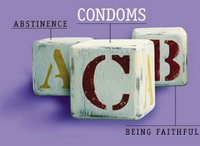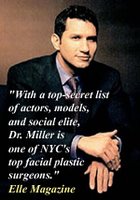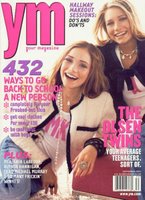 This is it! Plan B has been approved for over the counter sales! . . . sort of.
This is it! Plan B has been approved for over the counter sales! . . . sort of.
No. It's good. As these things go, however, there are a couple of caveats.
First - the customer must be over 18. I'm not sure how vehemently I disagree with this. I'm not ready to weigh in just yet. Comments? Opinions?
Second - Plan B will be located behind the Pharmacy counter. This means that the pharmacy has to be open in any given store (not great, seeing as the name 'emergency contraception' is very apropos). This also means that the customer must ask the pharmacist for the medicine, opening the door for many more news stories (and, in a perfect world, some court cases which would make the practice illegal) focusing on pharmacist refusal on religious or moral grounds.
[Quick tangent: the pharmacist should not be a pharmacist if they object to selling ANY kind of drug. The pharmacist is simply the dispenser. Do vending machines refuse chips to larger people? Do mailmen have the right to destroy porn rather than DELIVER the mail? Yes, I realize pharmacists go to school. They are knowledgeable about measurements and doses of medicine. They know stuff about medicine. But a large part of their job is to read a perscription and fill it. Just as a mailman reads an address and delivers. The question of morals or religion should never come in to play. If it does, you should choose a different profession. Would the same pharmacist refuse penicillin for a customer afflicted with an STD? And if there is such a moral issue, how come no one has refused viagra?]
Plan B, for those who don't know, is a pill taken up to 72 hours after intercourse to reduce the chance of pregnancy by 89% (according to the Plan B website). Another pill is then taken 12 hrs after the first dose. And that's it. Plan B is not RU-486 (aka "the abortion pill") which is taken after pregnancy. Plan B is simply around for the woman who misses a pill or (like an idiot) has unprotected sex. The drug will not protect the woman from STDs or AIDS. It is simply a precaution to prevent a woman's life from changing without her consent. Plan B will help (at least a little) reduce unwanted children, abortions, and over-population. Not to mention, it will help women live their lives the way they wish. Everyone wins!
Friday, August 25, 2006
Now it Can Actually WORK as a "Plan B"
Sunday, August 20, 2006
Book Club of One, Part 2 - Emerging from the Cave
 I figured it would be good to get my thoughts down about The Second Coming, by Walker Percy now, just minutes after I turned the final page.
I figured it would be good to get my thoughts down about The Second Coming, by Walker Percy now, just minutes after I turned the final page.
The book was a completely new experience for me. I felt, at times, as if I had detached from everything, the words on the page included, and the ideas and language were just flowing over me. But let's put the weird stuff aside for the moment.
The book is, essentially a love story. It involves Will Barrett, from Percy's The Last Gentleman and an escaped mental patient, Allison. Barrett, living a "death in life" after his father's suicide and to take Will with him, goes on a quest to figure out if there is a god. His sign comes in the form of Allison, an almost fairy-like girl with a strong connection to the earth. She is almost other-worldly in her healing powers, yet lacks the ability to communicate well with other people. Will, however, understands her unique way of speaking. Thus, Barrett finds life in life through Allison. Further, he finds an overwhelming sense of something larger through his relationship and happiness with Allison.
That is far from all. The book is much more in depth. The happiness Barrett finds comes at the end of a long, arduous journey through the depths of his inauthentic existence. Dialogue is the exception in this introspective novel, but Percy manages to explore even the most minor characters in depth through his language.
Some revealing quotes:
"Men love death because real death is better than the living death. That's why men like wars, of course. Bad as wars are and maybe because they are so bad, thinking of peace during war is better than peace. War is what makes peace desirable. But peace without war is intolerable. Why do men settle so easily for lives which are living deaths? Men either kill each other in war, or in peace walk as docilely into living death as sheep into a slaughter house."
"The room seemed to have an emotion of its own. Was it the feeling of someone present or someone absent? He frowned again and turned quickly toward the bathroom. No, rooms do not have emotions. Rooms are only rooms. How he hated the fake sadness of things. As he turned, he fell."
"Oh my God, how can a simple thing like a hot bath be this good, and since it is, is happiness no more than having something you've done without for a long time and aaah does it matter?"
"He was backing away. He had to find her. His need of her was as simple and urgent as drawing the next breath."
I would love to quote some of Allison and Will's conversations, but they seem silly out of context. Now, I just want to revel in my joy of good book-dom. Not sure yet what's next. Maybe it's time for Crime and Punishment. We shall see.
Past Obsessions
 As I drove home yesterday, I was hit with a one-two punch from the past. First I was caught behind a buggy. Yes, that kind of buggy - the one that should have had horses pulling it. Only there weren't horses because we live in 2006. So there was a motor. A decidedly non-fast motor. Needless to say, it made me pissy. I was stuck behind some jerk who ... what? Was he so lost that he needed something general to connect to? Was he flaunting his supposed wealth? Was he insane? What?
As I drove home yesterday, I was hit with a one-two punch from the past. First I was caught behind a buggy. Yes, that kind of buggy - the one that should have had horses pulling it. Only there weren't horses because we live in 2006. So there was a motor. A decidedly non-fast motor. Needless to say, it made me pissy. I was stuck behind some jerk who ... what? Was he so lost that he needed something general to connect to? Was he flaunting his supposed wealth? Was he insane? What?
Then I pulled into my driveway and saw the modern VW bug. Does the desire for this item stem from the same desire to own an old-fashioned horse-and-buggy-without-horse? Or is it a different animal?
I have always loved vintage clothes. For a while I was strictly 60s, then I moved on to the 70s. I liked the clothes better than the jeans full of holes. But I also had a desire to live in that time. Is that all it is? Are people unsatisfied with the time we are living now?
Possible. I read a scientific-yet-nostalgic book a couple of years ago, called Coming Home to the Pleistocene, by Paul Shepard that made a flawed argument for peeling society back to its barest bones. He argues that human nature is a part of our genetic heritage. Historically, Shepard argues, society and technology have bastardized that nature. In order to get back to our roots, Shepard recommends (essentially) moving backwards in time. He challenges us to get rid of all the comforts and technology we have become accustomed to. He argues for a neo-prehistoric way of life.[I'm using the word 'nostalgic' to indicate a longing for a particular culture's history, not a nostalgia for personal history]
Through this extreme argument, we can see the attraction of all things past. No matter how far back we go, it always seems like a simpler time. Is that what appeals to us? Somewhere deep inside, do we feel safer, less complicated while we're driving in a PT Cruiser? Does the new style of 'skinny jeans' make young girls feel like they live in the "less complicated" 80s?
This is also possible. 'Vintage' clothes are rarely worn by their original acolytes. There's a reason my mother willingly gave me her Coca-Cola bellbottoms to wear. People living in the time period that vintage clothes-wearers ostensibly desire know for a FACT that it wasn't a simpler time. The clothes and cars bring back memories of social unrest, oppression, and poverty (regardless of the time period).
I don't see a problem with it, this little quirk in our country. As long as someone as nostalgic as Paul Shepard doesn't gain power, I think its okay to find comfort in a seemingly less-complicated era.
I'd be interested to know if this phenomenon occurs within other cultures. I'm sure it does.
Thursday, August 17, 2006
Stephen Colbert's Balls . . . for Kidz!
 I'm not sure how I feel about Stephen Colbert's new call to arms. He is fucking with internet democracy. Join me, on a journey through my head as I try to reason this out. Don't be scared. The cobwebs are harmless.
I'm not sure how I feel about Stephen Colbert's new call to arms. He is fucking with internet democracy. Join me, on a journey through my head as I try to reason this out. Don't be scared. The cobwebs are harmless.
First of all, yes. I think I just coined a term: internet democracy. I'm talking about the relatively new phenomenon of user input on the internet. Colbert is exploiting the fact that this new idea has many uses, many of them counter-productive.
He has asked his viewers to go to a Hungarian website where voting is taking place in order to name a bridge. As of Tuesday night, the Stephen Colbert Bridge had around 2,400 votes. After mentioning it on the show Tuesday (along with detailed instructions navigating around the confusion of another language), the count on Wednesday night was around 438,000. These are rough numbers, I'm just trying to get into the debate (with my "formidable opponent"). For a little more detail, click here.
First - the good stuff, which bleeds into the bad stuff:
- Colbert is simply bringing to light a completely flawed process. The voting caught the eyes of the people at the Report because votes for the Chuck Norris Bridge were climbing into the 300,000 range. Ridiculous and interesting=perfect for the Report.
- After such a huge response, Colbert is now urging viewers to go to another site to vote on a name for a sports team's mascot which happens to be . . . an eagle. He wants us to name it the Colbeagle. I think they could have found a funnier name, but the concept, the connections - all funny.
- But where is this going to stop? The real reason I'm so wary is the way Colbert started. First, he saw his power when a huge fansite was started for him(see above link). He mentions the website on his show frequently and at the beginning he was (or seemed to me, at least) to be genuinly grateful and surprised at the amount of time and hard work people were willing to spend on him.
- Colbert next used his power on Wikipedia. In what became a pretty big story, Colbert changed the online encyclopedia whose content can be written or edited by anyone on the site. Here's a good summary of the events from Slashdot.org:
"The champion of 'truthiness' couldn't resist making fun of a website where facts, it seems, are endlessly malleable. But after making fun of Wikipedia on Monday night's "Colbert Report," Colbert learned some hard truths about Wikipedia's strength in resisting vandalism. Here's how the segment started: 'Colbert logs on to the Wikipedia article about his show to find out whether he usually refers to Oregon as "California's Canada or Washington's Mexico." Upon learning that he has referred to Oregon as both, he demonstrates how easy it is to disregard both references and put in a completely new one (Oregon is Idaho's Portugal), declaring it "the opinion I've always held, you can look it up."' Colbert then called on users to go to the site and falsify the entry on elephants. But Wikipedia's volunteer administrators were among those watching Colbert, and they responded swiftly to correct the entry, block further mischievous editing, and ban user StephenColbert from the website."
Yes. Wikipedia blocked him. Yes. This event was hilarious. And Yes: again, Colbert exploited a flawed internet tool.
Okay . . . so why am I not voting? Why am I not interested in helping Colbert show how ridiculous internet democracy is?
So, the bad stuff (for me, personally):
- I've never been one to follow a leader blindly.
- I've never enjoyed being one of the crowd.
- I don't like seeing humble people get cocky. Yes, I realize Colbert's character is cocky, but it's funny because it's false.
That's it. That's my main problem with this. Colbert is testing his power. He was shocked at the huge overnight increase in his numbers for the Hungarian bridge or "hid." It floored him. But after awhile, it stops being funny and ends up depressing and sad. Sad for our country (we're seriously looking things up through a resource which was written by people like me?), sad for the world (if Hungary's bridge is named after someone who has nothing to do with their culture, what does that mean? Yes, I realize the Chuck Norris vote was there first. So what does that mean?), and sad for Colbert (I don't want to see that head grow. I fear it would be bad for everyone).
Please feel free to add your ideas, criticism, and comments. Though I've pinpointed my main problem, I'd love your input.
In other news, from Broadsheet at Salon.com:
- Pharmacists are now refusing to refill birth control presecriptions. REFILLS, people.
- Gel bras can be used to trigger an explosion. I knew they were good for something. Kidding! Don't come arrest me.
- An abstinence-only education program in Canton, Ohio goes 'belly-up' when the results came in: 13% of the Timken High School population became pregnant last year. After 65 of the 490 female students at Timken turned up preggers, the board decided to include safe-sex education in their schools. Is this what it takes?
Monday, August 14, 2006
Playing Defense
Am I the only one who has a problem with this?
Bill Gates, who has contributed lots of money to AIDS research says that women are the "key to fighting AIDS." Great. Wow. A cure?
Nope. This is a prevention tactic. Following the example of scared African women, Gates believes women should have to take a pill or insert some foreign substance into their vagina (every day?) 'just in case' they're raped by someone with AIDS. Pills, gels, and creams are being researched for AIDS prevention.
"A woman could use one quietly, without having to ask her husband or partner to use a condom or to abstain from sex." says Reuters.
Should the research really move in this direction? Should the only resource for women be a 'quiet' use of gel inside of themselves so they don't have to stand up to the men they're with? I know. In sub-Saharan Africa, the female condom (which some women wear ALL THE TIME) has saved many from infection. But this is such a defensive reaction. And the fact that RESEARCH money is spent on this is astounding. Shouldn't we look for a cure?
Maybe I don't know enough about it. Maybe the money should be spent on other forms of RAPE prevention. Maybe we should get African women out of abusive relationships. I think the money could be spent on any of these things. Women should not have to be quiet about infection. We should help them and ourselves in other ways. And, as always, I believe it starts with education.
As Melinda Gates says in the article, "the ABC approach -- which stands for Abstinence, Be faithful and use Condoms -- does not always work." Obviously. Don't even get me started on ABC idiocy. But though a gel or cream would be great for prostitutes, I do not think unhappily married or otherwise victimized women should have to add this stuff to their daily regimen.
Don't get me wrong. I'm happy we're on the road to prevention. But I don't think this is the answer. Find a cure, help correct the social situation in third world countries. Teach these women self-defense. There are tons of other options when there's Gates money to be had.
Saturday, August 12, 2006
Pretty Women 2: Plastic Surgery Bugaloo
Magazines, men, women, the media, they all work together to make people feel inadequate. Women are dieting and having surgery before they've finished growing. They are changing themselves before they become themselves. Make-up (it's CALLED make-up for christ sakes!) can now be permanently drawn on your face. And abortion should be illegal for rational adults? I think this should be illegal. No surgery until you're old enough to know who you are (and does anyone ever completely know themselves?). We're not talking about 'killing' something that isn't alive in the first place(abortion). With plastic surgery, you can kill your chance at being who you are.
This stuff hits pretty close to home, so I'm sorry if I get too emotional. I do not condemn all plastic surgery. I think it has its place. I think women should feel good about themselves and be able to be proud of who they are and, yes, how they look. But all the roadblocks the government continues to throw up against abortion - anywhere from 24 hr to 5 day waiting periods, required viewings of graphic videos showing the procedure, parental consent, parental notification, illegal border crossings for the procedure - I think should be applied to something that does real harm to women and men. Plastic surgery.
A person should be required to wait a period of at least three days before they go through any procedure - from botox to liposuction. They should sit through a video detailing the gruesome details of the procedure. They should be warned of all the risks, shown pictures of surgery gone bad (much like the pictures some women are shown of aborted babies). They should meet protestors who make them feel like criminals. They should walk into places claiming to be plastic surgery centers and be met with a barrage of literature and people telling them how wrong they are to want plastic surgery (there are many false clinics claiming to perform abortions which turn out to be run by anti-abortion organizations). Plastic surgery seekers should be forced to obtain parental consent even when his or her abusive father or mother cut off the ear he or she wants replaced. In what is likely a very emotional time, they should be forced to search through their state for a place to go for help, only to find that the one plastic surgery center that operates within the state is too full of patients, protesters, and bomb threats to help hi m or her. Can he or she go to the neighboring state? Nope. It's illegal.
m or her. Can he or she go to the neighboring state? Nope. It's illegal.
Of course, I don't think this should really be the case, but hopefully I've made my point. I think plastic surgery is much more evil than abortion. And if it were treated as such, maybe less people would make a hasty decision. Let me re-state that I do think plastic surgery has its place. But I think that place should be in the hospital not "plastic surgery centers." I do not think men (which the majority of plastic surgeons are) should make tons of money off of the insecurity of women. I don't think any doctor should be allowed to specialize in cosmetic surgery. Unnecessary surgery. I think its a crime and should be treated as such.
Women and men should not be forced to wear a mask for their  entire life. If I see one more ad for plastic surgery offering to help you become 'the real you' I think I'm going to rip my face off. How's that for the real me? No skin at all! Is this the next trend?
entire life. If I see one more ad for plastic surgery offering to help you become 'the real you' I think I'm going to rip my face off. How's that for the real me? No skin at all! Is this the next trend?
Pretty Women
Okay, we all knew it was coming. This is one of many (I'm sure) posts about women and the current ideals surrouding women.
In modern American culture, women are supposed to be (alternately or concurrently) skinny, sexy, innocent, strong, beautiful, cute, childlike, and/or Amazonian. Young women are forced to compare themselves to these ideals and it is almost impossible for them to measure up.
I have never lived up to any of these ideals, and I'm over it. Of course, I wanted to be everything I've listed above. I still have issues with how I look, but I don't let those issues affect how I feel about myself. How I look is not related to how I live or who I am. And, living in this culture, that's as far as I've been able to come.
I do realize that men are suffering from increased expectations and male ideals. But this is rather new and has not permeated every facet of our society.
There are many topics to be explored on this subject, and I realize many (much more accomplished and talented) writers have articles and books relating to different expectations and goals for women in American society. But this is my blog and I want to talk about it.
In this post: Magazines
When I was a pre-teen, I wanted to look like the "normal" girls in YM. Yes, I was a subscriber. A bri ef visit to their website (I refuse to put a link) reveals the sections in the magazine: Beauty, Body, Stars, Style, and Private Life. Scrolling down, there is a poll asking: "Are you following the current war in the Middle East? " The choices are: "Yes, it's scary! I watch the news or read about the situation to try to understand what is happening between Israel and Lebanon." or "No, I really have no idea what is going on there. "
ef visit to their website (I refuse to put a link) reveals the sections in the magazine: Beauty, Body, Stars, Style, and Private Life. Scrolling down, there is a poll asking: "Are you following the current war in the Middle East? " The choices are: "Yes, it's scary! I watch the news or read about the situation to try to understand what is happening between Israel and Lebanon." or "No, I really have no idea what is going on there. "
Okay, so I guess it could be worse. At least they are addressing the fact that there's something going on in the world outside of 'body' 'style' and 'stars'. But "yes, it's scary" and "try to understand?" What kind of language is that? Perhaps an article about the crisis (minus the flowery, condescending language) could address the situation more fully. Is there a reason this POLL doesn't ask people what they think of the crisis? Who they think is right? If anyone is right? Yes. They assume these girls can't UNDERSTAND the concept of the war. The issues behind the war. The history is complicated, yes. But I think we should give young girls more credit. Maybe then they'd try to live up to it.
These magazines, along with magazines for older women, not only perpetuate bu t create ideals. Going back to YM (my only first hand experience with a magazine of this ilk), I was affected for years by one of the more 'serious' articles in the magazine. It was an article (probably from the 'Body' section) about a girl who had different sized breasts. Everyone does. Hers was particularly severe. The story was about how she had plastic surgery and now lives a 'normal' life. (This kind of plastic surgery is necessary because of the type of society we live in. I don't blame the girl. I would've done it had I been in her position.) Naturally, for a couple of years, as I watched my breasts grow, I feared I would turn out like the girl in the article. That was time spent worrying about something I had never thought of before. The article (if I'm remembering correctly) served as a warning to girls. Don't just assume you're normal. Make sure you ask your doctor about plastic surgery. It may be right for you.
t create ideals. Going back to YM (my only first hand experience with a magazine of this ilk), I was affected for years by one of the more 'serious' articles in the magazine. It was an article (probably from the 'Body' section) about a girl who had different sized breasts. Everyone does. Hers was particularly severe. The story was about how she had plastic surgery and now lives a 'normal' life. (This kind of plastic surgery is necessary because of the type of society we live in. I don't blame the girl. I would've done it had I been in her position.) Naturally, for a couple of years, as I watched my breasts grow, I feared I would turn out like the girl in the article. That was time spent worrying about something I had never thought of before. The article (if I'm remembering correctly) served as a warning to girls. Don't just assume you're normal. Make sure you ask your doctor about plastic surgery. It may be right for you.
Teenagers are impressionable. They are figuring out who they are and who they want to be. Hell, so are adults. Women's magazines show women who they SHOULD be. Who they should WANT to be. It derails younger and older women alike. It takes away their creativity, their uniqueness.
Yes, that is melodramatic. I was able to hold onto myself and I'm happy with who I am today. But can I really say that? I'm happy with myself inside, but I doubt I'll ever overcome the ideals surrounding the way I should look. I wear certain clothes and dress a certain way so that I can function, so I don't have to worry about the quirks my body throws at me. I would choose different clothes if I felt more comfortable with my body. But EVERY normal person has something weird or different about their body. Why can't we all just decide to be okay with those differences? Why do we all have to look the same?
Leave it to Canada to get it right. Check out Shameless Magazine for the right kind of teen magazine.
Wednesday, August 09, 2006
Confessions of a TV Junkie
I admit it. I'm completely hooked. As much as I love to read, listen to music, write. As much as I need to exercise. TV usually wins. I love losing myself in other people's lives. ("What luxury, to be so happy / that we can grieve / over imaginary lives.")
So, since summer is wrapping up, I thought I'd write about a couple of shows that I'm really enjoying. Check them out. First, two reality shows (yikes!).
- 30 Days - Morgan Spurlock of Super Size Me fame is co-executive producer and narrator of this reality show. Each week, it takes a person with strong beliefs and places them out of their element for a month (30 days). For example, a homophobe lives in San Francisco with a gay couple for thirty days, an evangelical Christian lives with a Muslim family for 30 days, a mother binge drinks (imitating her daughter), a minuteman lives with illegal immigrants. Each person has to immerse themselves completely in the new culture or lifestyle. The focus is not on "drama" (typical of many reality crap shows). Rather, the show asks the question (and seeks to answer it) "Can someone really change (in thirty days)?" So far, most of the people have changed at least a little bit. This is not about humiliation. This is about people, emotions, and paradigm shifts. It's great television. I've cried during more than one episode.
- Who Wants to Be a Superhero? - This is a little more along the lines of a typical reality show. The contestants are given challenges which they have to complete, and two people are eliminated by the end of the show. The prize? A comic book featuring the superhero they invented and a movie on FX. Both prizes feature the winner him/herself. Here's the reason I watch: the challenges test personality traits, not strength or endurance (though one recent test did show us a contestant with TREMENDOUS endurance). Instead, the show focuses on so-called "super-humans." The winner will have the heart and 'soul' of a superhero. I know. It sounds cheesy. Maybe it is. But I enjoy it thoroughly.
And now for the fictional side of things:
- Eureka - It's the same old story: small town, po-dunk people with problems. The problems, however, are fueled by the secret government side of the town (covered by a mystical barrier). This area is a mecca of brains and talent. The highest functioning humans in America are located here. And this show proves that they are still only human. Though the town has many anomalies, the people are pretty normal. They make mistakes. Experiments go bad. Wackiness ensues. This show requires about three viewings to really grab you. But it gets there, I promise. The actors are not the best in the world, but they're interesting. It's a fresh idea (as far as I know) with many opportunities for unique episodes.
Jason and I also caught up on some shows we missed the boat on:
- Battlestar Galactica - the show that brings sci-fi nerds, cinematographers (and people interested in camera work), actors, and general lovers of story and drama together. It surpasses the brand name everyone knows. This is a political drama. Aside from some crappy acting (which is well-balanced by some of the best actors on television), I can see no flaws in this updated version of the campy 70s show.
- Lost - I'm on it. The bandwagon. This show is extremely well-written and well-acted. I can't wait for the new season
- Smallville - this is my guilty pleasure. I'm gradually becoming okay with the fact that the main reason I watch this show is that I get to watch a lot of pretty people (and some not-so-much) do . . . stuff. I have fallen in love with some of these characters. And Tom Welling . . . there's just not much to say. Sigh.
- Alias - I'm still on the fence. I'm not sure I love this show. I'm at the end of the first season and it's getting a little too "mystical" for me. I'm a tad hooked though. I really like the characters, and they're what keep me coming back.
Shows I can't wait for/stand-bys I love:
- Scrubs- I have to wait until January!
- The Office - It's rare that television can make me laugh out loud at all, not to mention during every episode.
- Veronica Mars - A Whedon-esque show.
- Bones - another guilty pleasure - I'm not sure why. I think it has to do with my love for Angel and the Joss Whedon-less TV universe right now.
- How I Met Your Mother - Jason and I started this one, then stopped, and came back to it. His love for Alison Hannigan brought us to the show in the first place. It's not one of my favorites, but I do like to lose myself in trivial lives every now and then.
- Big Love - gotta love HBO: a polygamous, Mormon family lives in "the real world."
- Arrested Development - I know. I don't care that it's canceled. I will be watching repeats on Mondays, pretending it's still on. Delusional? Yes. But perfect television doesn't come around that often.
- and, of course, a steady stream of The Daily Show and The Colbert Report to keep me grounded and sane.
I think that's it. Wow. I'm sad. Oh well. Now you know. This is why I never talk to anyone.
Saturday, August 05, 2006
Book Club of One: BEE SEASON
When I finished The World According to Garp, by John Irving, I wasn't sure what I was using this blog for. I didn't know if people would be interested in my comments about the book. Now, I guess I've decided it doesn't really matter. I'd like to get my thoughts down for myself. My memory is really bad.
I guess I'm also more interested in commenting on Bee Season (written by Myla Goldberg) because I won't be gushing over it. Irving's book was really wonderful and I didn't have too many bad things to say about it.
While we're here though, I will mention a couple things about Irving's novel. I adored the unpredictable, tormented, beautiful characters present in the book. That's what I look for in literature. I love character. Plot is secondary, though obviously still important.
I also loved the fact that, though the narrator seemed omniscient at times, we were always centered in Garp's world. Though the narrator commented on things Garp might not have been aware of, he/she/it (the narrator) always threw in qualifiers when identifying the emotions and thoughts of other characters.
My one problem was with the motifs throughout the novel. That was the problem, actually, there seemed to be a lot of new repeating images and ideas in the last 1/3 of the book. As I have a terrible memory, I can think of no examples at the moment. But it seemed a little forced. Of course, the novel covered so much time and so many events that it would have been impossible to keep motifs consistent throughout. And I can see how motifs can lead to a theme simply by changing. But the one in particular I'm thinking of took place in a flashback and should have come into the story long ago.
But this post is supposed to be about Bee Season.
Bee Season was Goldberg's first novel and I think it reads like one. It is the story of a little girl stuck in the remedial fifth grade class. She wins the school spelling bee, to everyone's surprise and goes on to win the state. She gets very far in the National spelling bee, but loses. This is the first 1/3 of the book.
The rest of the book is about her (Jewish) family and how exactly it falls apart. The daughter, Eliza, studies the teachings of a Jewish mystic with her father, attempting to achieve transcendance through her connection with letters. The father (Saul) realizes how badly he's been hiding his disappointment in his daughter's intelligence when suddenly he spends all his free time studying with her; the son (Aaron) feels neglected by the loss of his father's time and seeks a new religion; the mother (Miriam), who had always been a non-participant in the family, slowly reveals exactly how nuts she is when she is arrested for breaking into a stranger's house and stealing a vase. Throughout the book, the reader sees that she believes she is gathering pieces of herself. By the end, her real home is revealed, to Saul and to the reader. It is a neatly organized house made of stolen objects located in a storage facility. She ends up in a "hospital," refusing to see anyone in her family. Aaron ends up with the Hare Krishnas, Eliza ends up achieving transcendance (by first losing all bodily function) without her father's help (she also loses the school spelling bee the next year on purpose), and the father ends up with no one and nothing.
Though the story is surprising and interesting, Goldberg switches point of view unnecessarily and often. Though this gives the reader an understanding of each character (I think we would be lost otherwise - why is Miriam stealing a shoe? a bowl?, why is Aaron wearing an orange robe and chanting), it was distracting for me as a reader. I think I would have preferred to feel the cracks in the family through one person's eyes. It would have been a nice tension builder and would have given me (the reader) a nice sense of what each character was feeling - a disconnect. I think I felt too connected.
I really like Goldberg's sense of character, though. And I her depiction of the two younger members of the family was perfect. I love a writer who can get into a child's head.
So that's it for me. Sorry it was so long. I'm very excited about my next book. I've been interested in Walker Percy for a while now. He's been called an existentialist (interested in the alienation of the individual and the search for a more "authentic" existence), a philosophical novelist, a Catholic, an MD (with interests in pathology and psychology), and a Southern writer. Woohoo!
